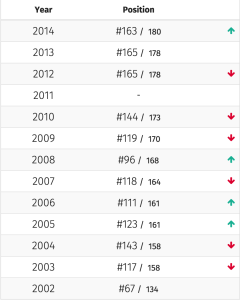Bahrain is dancing around press freedom
Faten Bushehri
Every year, I find myself looking back at Bahrain and not being able to identify any sign of progress in press freedom. It has been five years since the popular uprising erupted in 2011, yet the problems remain very much present.
Measuring progress of press freedom in an authoritarian regime is tricky, especially when you have a government that puts more effort in symbolic gestures and public relations stunts rather than real change. Five years ago, journalists and activists were targeted by authorities for doing their job reporting on the events on the streets, and so were regular citizens who dared to express their opinion on any public outlet like social media platforms.
Bahrain Independent Commission of Inquiry (BICI) report has recommended for the Bahraini government to pay more attention to reforming the media, and allowing opposition groups to have a voice in the mainstream media to reduce frustration and empower the civil society. The report has documented cases of journalists arrested, two of which were killed while in police custody. Even foreign journalists were detained or deported from the country for reporting on the events and protests, including correspondents from the New York Times, Reuters, CNN, ABC News and several more.
However, many more journalists faced similar fates since that report was published, and nothing has been done to improve freedom press. Up until today, Bahrain’s efforts in taking steps towards press freedom have been despicable and shaky. So far all steps and attempts taken by the Bahraini government are a façade, and journalists are still being targeted and punished. In 2013 Bahrain ranked 165 on Reporters Without Borders (RSF) press freedom index, and in 2015 Bahrain was bumped up to 163 out of 180 countries. Even in comparison with Kuwait ranked 77, Bahrain falls behind. According to Freedom House index Bahrain actually got worse in 2015 compared to the past few years.
Position since 2002 according to RSF
In Bahrain, actions that may look like positive steps towards press freedom are quickly followed by other acts of crackdown. The only independent newspaper in Bahrain, Al Wasat, was subjected to harassment and suspended from publishing in August 2015 for the second time (first time was in 2011). Two days later the suspension was lifted and the newspaper was allowed to resume its work. While this might come off as a positive step, it is not. A newspaper should never be suspended for publishing views that oppose the government to begin with.
Earlier this month, Bahraini authorities introduced stricter measures to monitor people’s discussions on social media platforms such as Whatsapp. The Ministry of Education asked heads of secondary schools in the country to examine message exchanges between teachers and students, in order to take legal action against anyone found to have insulted authorities. Currently, at least 13 journalists are detained in Bahrain, including Mahmood Al Jazeeri who worked for Al Wasat and was arrested and charged on terrorism charges. Photographer Ahmed Al Fardan also remains behind bars serving a sentence of three months for participating in an “illegal gathering”. A prominent journalist and blogger Abduljalil Alsingace is still serving his life sentence for his role in the uprising.
Recently, four American journalists were detained for a day after covering protests on the fifth anniversary of the Bahraini uprising close to Sitra village. They were questioned, accused of participating in illegal gatherings and entering the country illegally. One day later, all four journalists were released and safely deported back to the U.S. Again, there is nothing that screams press freedom about this gesture.
A track record of preventing journalists and NGOs to access Bahrain is broken down on Bahrain Watch. The goal is minimize the window through which the outside world can see what is really happening in Bahrain.
Aside from the biased print media in Bahrain, all broadcast media are state-controlled by the Bahrain Radio and Television Corporation, where people in power positions are appointed to ensure the delivery of pre crafted discourse. This leaves only one struggling platform for opposing views, Al Wasat, to battle the constant harassment while trying to deliver objective journalism.
The regime in Bahrain has become a master in taking one symbolic step forward and two steps backward to perform a perfect Salsa choreography in press freedom. Nothing has changed since my article last year on the media situation in Bahrain. There are no signs of improvement, but only signs of creativity in silencing voices. They can imprison people’s bodies, they can limit journalism practices, but they can’t control thoughts and ideas.

